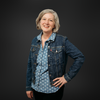Podcast Episode 89: Explore Jewish Genealogy in Philadelphia
Explore Jewish genealogy and history in Philadelphia. Discover the Jewish Genealogical and Archival Society of Greater Philadelphia's work, their research resources, and upcoming events.
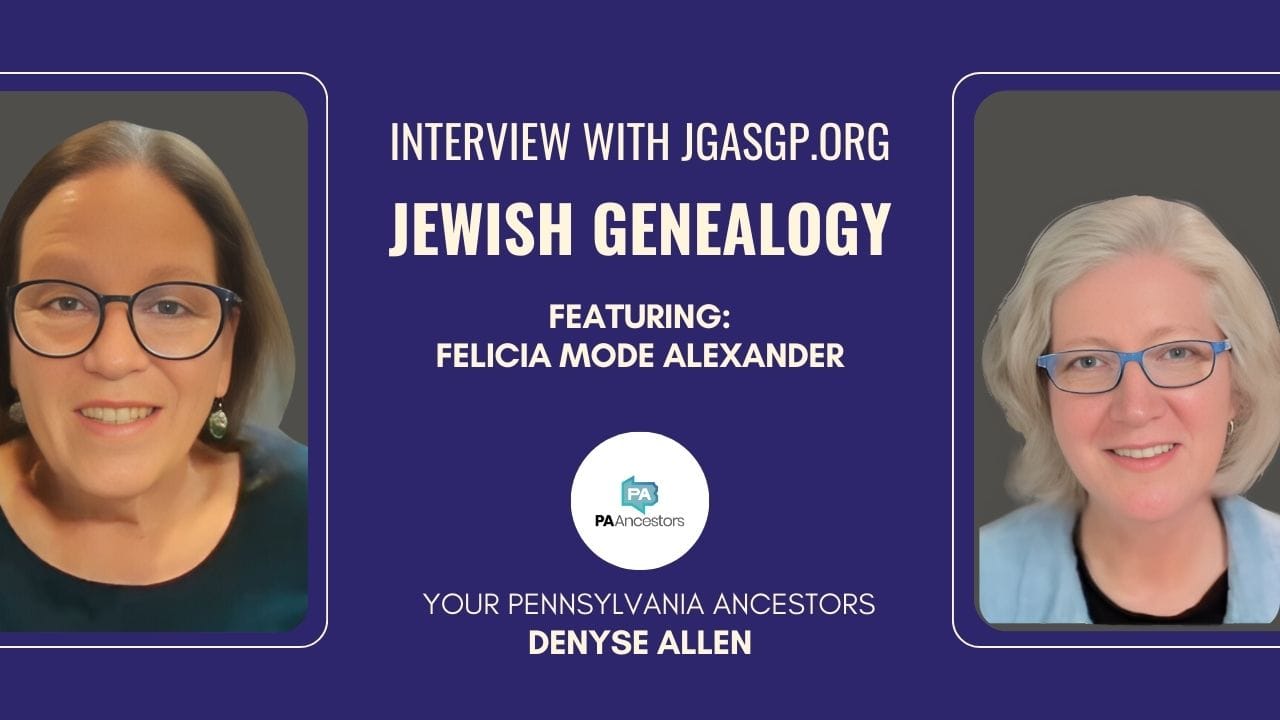
Pennsylvania has always been a melting pot of diverse religions since the state's founding. Hear from Felicia Mode Alexander, President of the Jewish Genealogical and Archival Society of Greater Philadelphia (JGASGP) and discover their fascinating work in tracing Jewish history in the Philadelphia area, their research initiatives and resources, and their big conference in August 2024.
JGASGP has been contributing remarkable work for over 40 years. It started as a small group of genealogists who faced challenges accessing records for Jewish research. Today, the society has an extensive website, and facilitates global research and documentation of Jewish history.
Understanding the Jewish Diaspora
Most Jewish genealogical research work acknowledges the Jewish diaspora and its widespread impact. For instance, the Spanish Inquisition led to Jews being expelled from Spain and Portugal, causing them to scatter across the Mediterranean region. Felicia provides compelling examples from her own family history, highlighting the journey Jewish families often took across multiple countries.
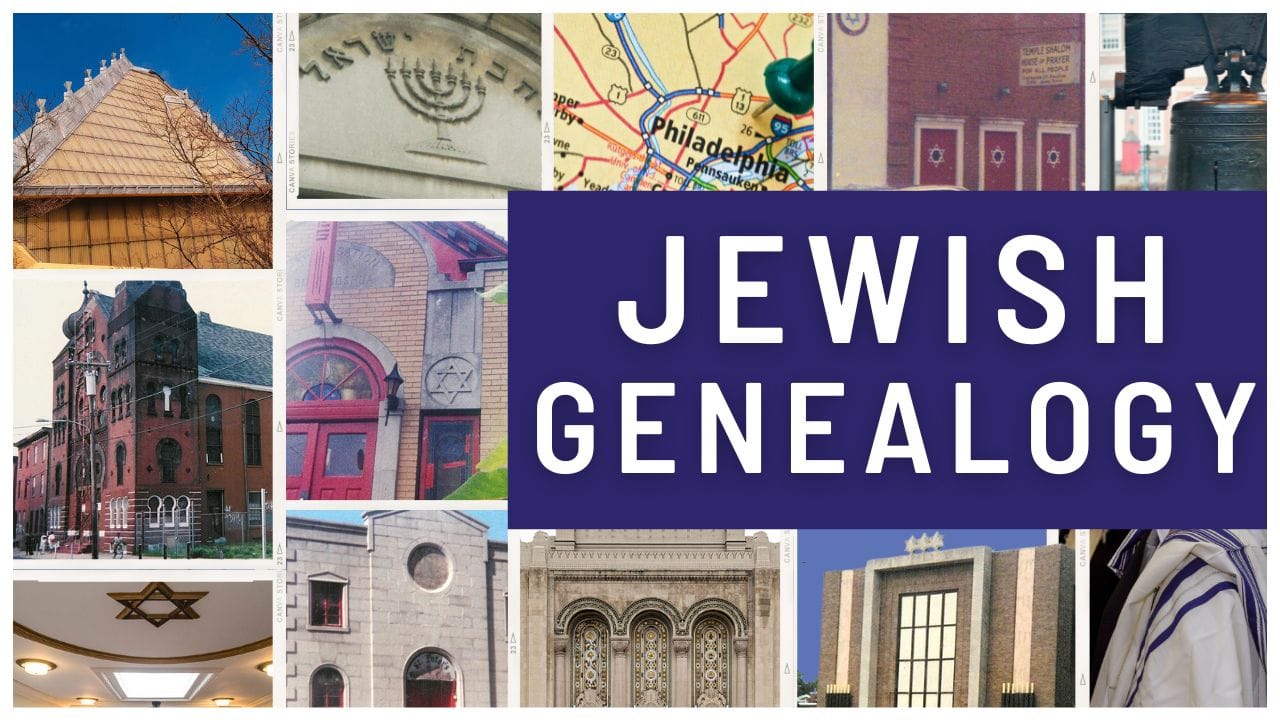
Historical Tidbits
- Ladino Language: Jewish people in Turkey and Greece spoke Ladino, a blend of Spanish and Hebrew, rather than Yiddish, which is more commonly associated with European Jews.
- Small Villages: At conferences, Felicia met a researcher who had significant information about her family's hometown in Poland, sparking her deeper interest in genealogy.
Jewish Genealogy Research Projects and Initiatives
Conferences and Events
JGASGP is known for its robust educational events. The 2024 conference is set to be held at the Sheraton Downtown Hotel in Center City, Philadelphia, featuring over 150 speakers covering a broad range of topics related to Jewish genealogy. The conference will cater to all levels of interest, from novice genealogists to experienced researchers.
"From August 18 to the 22nd this year, we will be hosting a large in-person only event with over 150 different speakers."
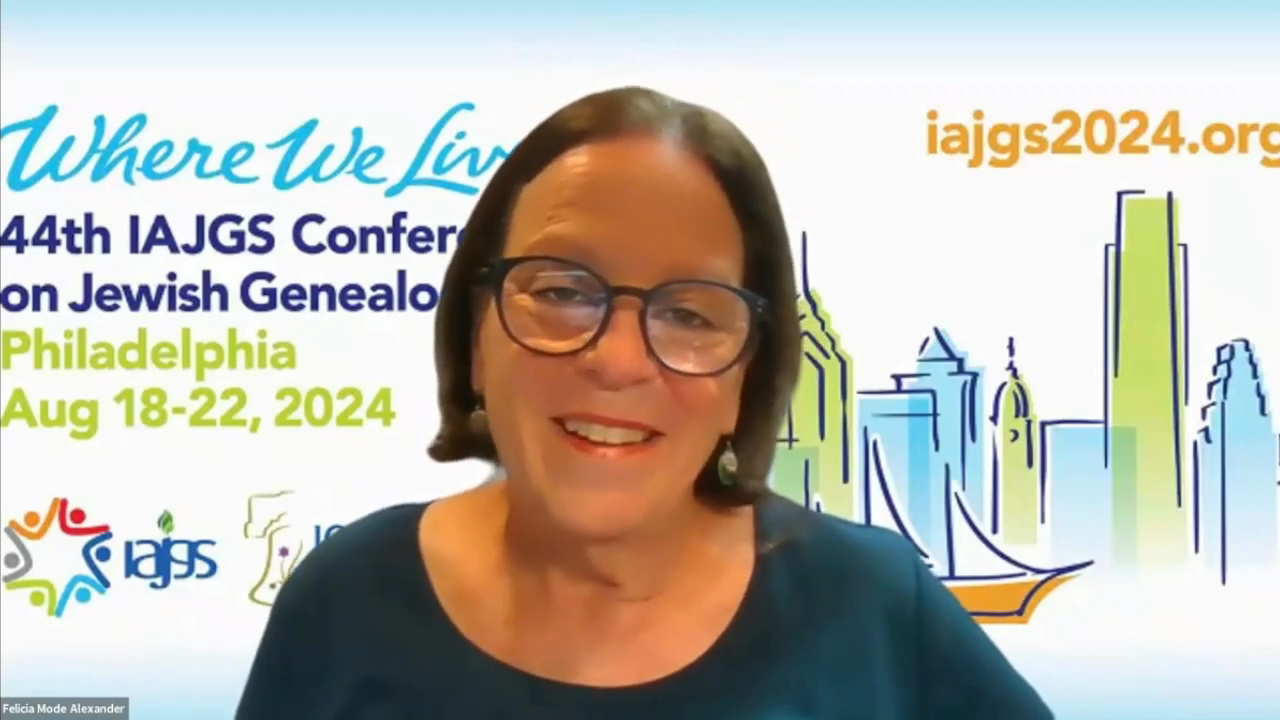
Outreach and Educational Initiatives
The society’s efforts don't stop at conferences. They extend into community engagement, offering educational workshops, partnering with local and international organizations, and digitizing historical records. These include cemetery records, which are crucial for genealogical research.
Digitization Projects
Digitizing older records, particularly from cemeteries, is one of the significant contributions JGASGP makes. Two substantial projects involve Har Jehuda and Har Nebo cemeteries, where 20,000 burial records have been digitized.
"We had a team of amazing volunteers who actually went into the cemetery office and took scans of all of the cemetery cards...over 20,000 of them."
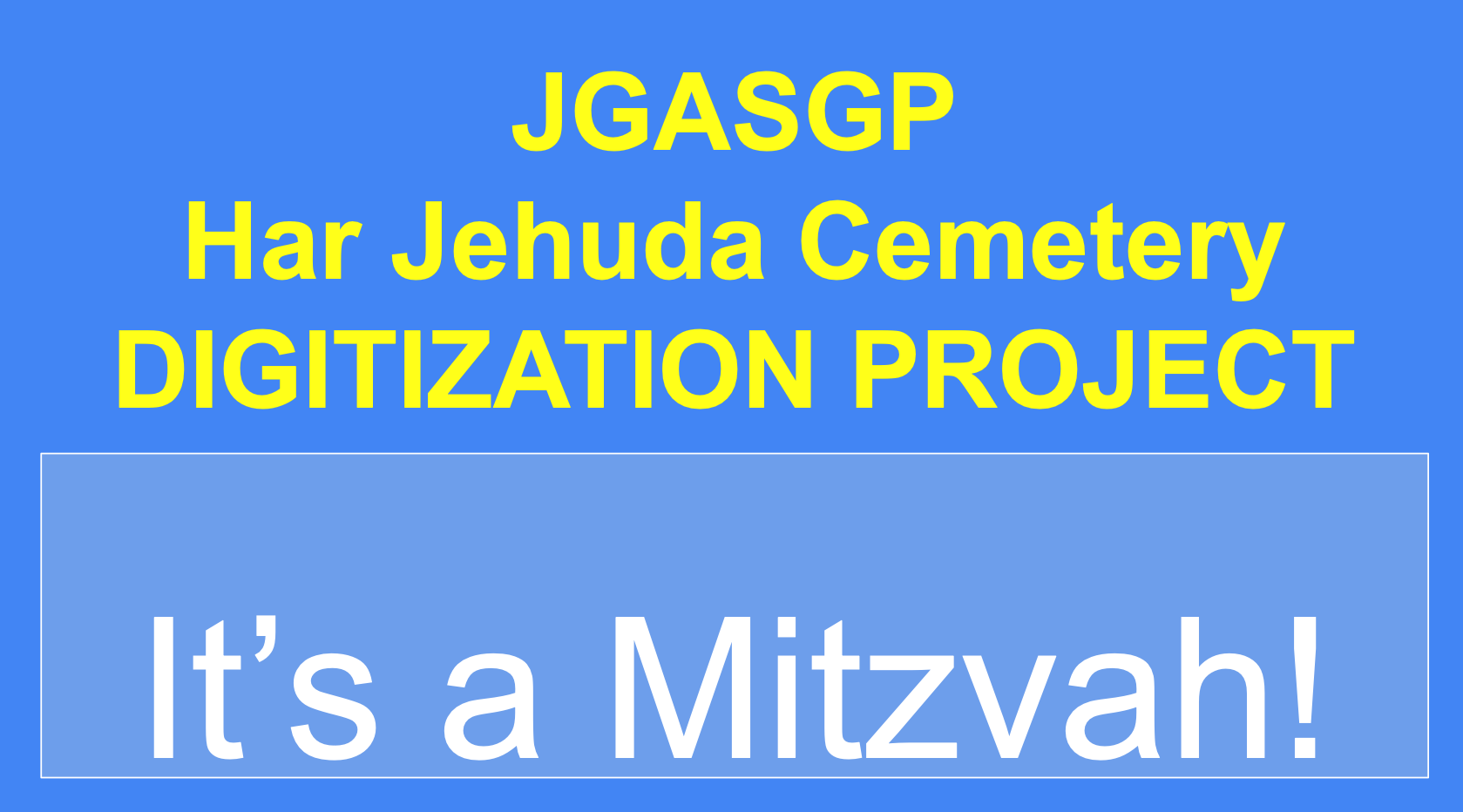
The Society's Website
The JGASGP’s website includes old photographs, such as pictures from Atlantic City from 1915, newspaper indices, family finders, and scholarly journals. One notable feature is the inclusion of captions for each photograph, providing context and historical significance. The podcast shows where to find the following:
- Family Finder
- Jewish Exponent Index
- Getting Started Booklet
An Invitation to Explore Jewish Genealogy
For those interested in Jewish genealogy or simply curious about the rich history of Jewish communities in Philadelphia, the JGASGP is an invaluable resource. Furthermore, the inclusive nature of the society ensures that everyone, regardless of their background or level of observance, can find something of interest.
For more information, visit their website at JGSGP.org. Come join the Philadelphia Jewish genealogy community and uncover your past!
Additional Resources & Links
- JGSGP Website
- Upcoming Events and Conferences
- Weitzman National Museum of American Jewish History
- JewishGen
Transcript
Alright for today's your Pennsylvania Ancestors podcast. I am very excited to have my first religious society on the podcast. Pennsylvania is incredibly diverse for the amount of religions that we've had since the founding of the state, and I've been intending to focus on religion. So I'm really excited that the Jewish Genealogical society, as I call them in my brain, is here to join us. But they have a full name. Let me give the full, absolute name so I don't cheat them of any of their, their, any of their work, because they're doing great work. It's the jewish genealogical and archival Society of Greater Philadelphia is joining us today, and Felicia Mode Alexander, their president, is going to share with us about the society, the work that they're doing, and a very, very exciting event that they have coming up shortly in 2024. Felicia, welcome to the podcast.
Thank you so much. Denise. I'm really excited to be here. I'm excited to be able to share with you about our society. It is over 40 years old and was founded by a small group of genealogists at a time when there was no Internet, there was no technology online through which people could easily access their important data. And now, today, we have our own website. We have a facebook page. We are part of an international body of like minded genealogists that are working all across the globe to research and document jewish history and the many ways that we all go back in time to common location, place, and roots. I love it. And I told you before we hit record how much I love your website, because the society website, your organization's website is so, just full of. It's so much goodness. I can really tell you've taken the care to note not just the history of the jewish people here in Pennsylvania and the county surrounding Philadelphia, but you're covering their roots back in their home country, too, and the connections. So how did the society choose that as a focus? Because it could have been easy just to, you know, a lot of geological societies obviously focus on the location where the society is, but you chose to go abroad, and I'd love to hear more about that.
Certainly most of us who are, who are doing jewish research have discovered that our people came from places far and wide, and this is common in the jewish community because of the jewish diaspora, which means that when people were, for example, during the Spanish Inquisition, there were many, many, many jewish people living in Spain and Portugal, and they were expelled. And so during that particular expulsion, they scattered all over the mediterranean region. My own daughter in law's ancestors are from that part of the world. They were in somewhere in the iberian peninsula, we don't know where, but ended up in a place called monastir, Turkey. And when you think of Turkey, you don't necessarily think about jewish people, let alone a large jewish community or Greece. People settled in the main city, one of the main cities in Greece. These folks didn't speak the traditional language that you would think of when you think of european Jews, which is Yiddish. They spoke a version of that was a combination of Spanish and Hebrew that's called Ladino. So this is all information that I never knew about. But when I got involved in the genealogy, even before I had a daughter in law who was from this. This background,
I didn't even know where to look to find out information about the jewish roots in Europe. So most of us who do this work have found ancestors that may have come from ten different countries or from one. And, for example, when I started doing my own personal research, I grew up in the Boston area, and I knew that my family had been in Boston for over 100 years. They came to the United States in the 1840s. But what I didn't know was that they came not because they were fleeing, necessarily religious persecution, but because they were looking for more opportunities in business and commerce. And so that was one wave of Jews that came from the german speaking lands. And then it was another 30 years after they arrived, that the Russians and the eastern Europeans came, and all these different waves of jewish immigrants brought with them different names, different home communities. And all of that became part of the quest of genealogists, jewish genealogists, to find out, well, where was my original town called? A shtetl, like in fiddler around the roof, the little town. Where did they come from? And mine.
By going to a genealog conference, I actually met another researcher who had been doing research on her little hometown in Poland. And she was not jewish, but she was fascinated by the jewish history. And when I found out that she was going to be there and researching the town that my family came from, I reached out to her, and she came to this conference in Warsaw, Poland, where we had yet another one of these international conferences. And she brought a whole folder full of information about the jewish community of this small town. So I went with my Boston knowledge, knew that my family had come from this little town called von Groveitz through their naturalization documents. That's all I knew. And here this woman showed up at the conference with more information. And my interest just exploded at that point, because I realized, wow, I had no idea. I don't know anything about these people. And I started digging really deep at that point.
So my story is one example of how doing the research extends to going to conferences. And you mentioned the website, which I'll share in a moment, but it's quite fascinating how many ways that you can do research if you find out that you have jewish ancestors. Yeah, I love that story because the connection in genealogy is amazing. And what people do for each other to support, you know, others that we don't even necessarily know, total strangers along on our journey is amazing.
So the greater Philadelphia area for people that aren't familiar with Philadelphia involves the surrounding counties, correct. So's Bucks, Chester, Delaware, Montgomery, as well as the city of Philadelphia. Do you. And also some of the New Jersey suburbs as well. I was just going to ask you, extended to New Jersey because so many people left that the Philadelphia area moved to New Jersey at one point. Okay, perfect. So, New Jersey folks, if you're listening to the Pennsylvania podcast, you have welco you can get.
So I do want you to talk about your big event coming up because you do have regular events for your members every month. But your biggest event is coming up this August, and it looks fabulous. Like, I wish I had jewish ancestry. Let me just tell you. I have, like, this 1% in my DNA. This 1% in my DNA. I don't know what it means. I'll get there to figure it out. But I do. I do want to learn more about this conference because I love the city of Philadelphia, and a conference there would be fantastic.
So we'd love to have you come. You know, it's going to be an exciting event. From August 18 to the 22nd this year, we will be hosting a large in person only event. It will be held at the Sheraton downtown Hotel in Center City, Philadelphia. And we will be having over 150 different speakers coming, talking about all different aspects of genealogy, over jewish genealogy, over different time periods. For example, there will be one thread that is focusing on Philadelphia and the mid atlantic regions, specific Ro and jewish roots in the area, because most people don't know it, but jewish people have been in Philadelphia going back 300 years, and we are one of the oldest jewish communities in the nation, that longest continuously operating jewish communities.
And in Judaism, there are many different religious branches of the religion. And this conference welcomes everyone. So if you are very religious and orthodox, you are welcome. And we have kosher food offerings. If you are only secular and were not raised in a religious family, that's fine, you're welcome. We will also be having beginner workshops, because through DNA research, a lot of people are discovering that they, like you said, you're 1% jewish. From who knows where, people are finding out that they might be 30, 40, 50% jewish, but unaware of this because the family was not no longer practicing or because of adoption or divorces, you, changes in family makeup. And so we'll be having beginner workshops for people who are wanting to learn more about their jewish roots. When I started doing this work, I didn't know that much about jewish life because my family was not observant. They were, you know, my dad. My dad's family always talked about how they would go into synagogue for special holidays, but not every week. Other people are in having services. You know, they have services on Friday night, and they go every week and so forth. So this conference welcomes all people who are interested in jewish ancestry. And so this event is being co sponsored by our society as the local host as well, and I'm the local chair of this conference. And then we also.
Our umbrella organization is the International association of Jewish Genealogical societies. And this is. It's the body through which all these different jewish genealogy societies can interact and communicate with one another and co sponsor events. And we have. Ihaggs has its own board of directors, and we also have other organizations that are working with us.
For example, the new. The Jewish Museum in Philadelphia that has been renamed the Whitesman National Museum of American Jewish History is one of our sponsors, and they will be offering tours of their museum twice a day all week, and those will be available to any of our attendees. We also have organizations like Jewishge, which is the mother lode of jewish genealogy research. It's another massive website. I want to just add that we will also be having a film festival at the conference, all different types of films related to jewish culture. So people will have the opportunity to attend both workshops and our film festival, and also a very robust exhibit area and a share fair. So the shareare will be all different local organizations that have the opportunity to exhibit information about their organizations free of charge, which is different from exhibits who are usually trying to sell books or invite people to join their societies, or ancestry.com is always that. Our exhibity and myheritage and the jewish genealogical organizations, and not even all jewish ancestry is for everyone. So, yeah, walk us through your website. That would be great, certainly.
So I'm very proud of this, because when I became president several years ago, shortly before COVID hit the website was, we had it. But because I'm a retired teacher. I'm very much an advocate of having good technology as a way of spreading information. So we've added a lot to the website since I became president. And, for example, well, this is our, each of these drop down lists offers easy access to our information. But we have photos. I love this part. These are our old photographs of old Philadelphia. And these are all related to the jewish community of Philadelphia going back 100 years. And there are captions for each one. This is, let's see if I can find a good one. Okay, so Atlantic City, when you think of Philadelphia, you don't necessarily think of Atlantic City, but Atlantic City was one of the favorite vacation getaways for the Jews of Philadelphia who would get out of the city of Philadelphia and head to the shore. And so that's an example of a picture that was taken by somebody who submitted it to our society and said, yeah, my family's in that picture. And some other pictures that's, I believe that's Ellis island. So these are historic pictures that are related to immigration.
Sorry to interrupt, but that picture of Atlantic City in 1915 is such a beautiful point of time to add to your family history, because if you knew your family vacation, you could add that to your family story, know, and show that to your children to get. I mean, those buildings don't exist anymore, right? You know? Right. They're gone. They're gone. There's castinos there now. And even if, if you're somebody who is interested in identifying photographs by the type of dress, there are historians and genealogists who focus on genealogy through photography. And so if you look at this, you can see the men wearing long, like this gentleman here, he has on a long one piece bathing this one as well. And the women all wore long dresses to the beach back. They didn't wear bathting suits. So you can actually date this picture by the attire and the beach, the cabanas at the beach and all of those kind of stuff. And so on our homepage, I'll go back to the homepage. So when you come up to the homepage here, the first thing that you see is the information about our conference. So for anybody who goes on to the website, it's very simple. It's just the letters of our society, jg sgp.org. and it's right here. This has the information about the conference. So you can actually click on that. Here's the registration for the conference. And it has the information about all about the conference this summer. There's even a YouTube video which is of I'll hawk this. I would like to invite you. This is an overview of the conference that I was asked to create. And so that went onto the conference website.
So back to our website. We have a slideshow that is outstanding that was just put up this past week because one of the missions of our society is preserving jewish memory in Philadelphia, and because there used to be an even larger community of jewish people in the city itself, as opposed to the sprawling suburbs that include cemeteries. And genealogists are known to be cemetery sluutices, there are also jewish cemeteries that are very helpful to look at headstones, because they're usually in Hebrew, and they often say the names of the ancestors of the parents. So, for example, my grandfather's headstone and his father's and his fathers all have the names of the generation precedings. So it's a son of so and so. So that's very helpful. So we have, our society has done, through, purely through volunteer work, the digitization of two of Philadelphia's oldest and largest cemeteries. And one of them is called Haruhuda, which is just outside Philadelphia, and the other one is called Harnebo. And both of those are digitized. And the digitization project of Par Yahuda was conducted over the past year. And we had a team of amazing volunteers who actually went into the cemetery office and took scans of all of the cemetery cards, the burial cards of the individuals, over 20,000 of them. You can go in and look through these cards, and these are some of a map of the cemetery. These record books are vast. So here's an example of this one person there. This is not necessarily for a work of art to see what these things say. You can see there's about three different types of handwriting on here, and yet this one is typed. And here's another book going back. This was going back to 1910, I believe. And so all of this was photographed and put onto our website. And going back up here, some of the resources and publications we have, we have a getting started book focusing on the Philadelphia jewish community.
But it's quite amazing. And this was created by one of our members, made this beautiful, beautiful document, which takes you through all of the different places in Philadelphia and learning to read jewish names that are written in Hebrew or in Yiddish. And I'm not going to go through all of that, but that's something that people. People can access without it being a fee based item. If you. We have monthly newsletters, but we also have a scholarly journal. And the journal goes back all 40 years of our society. So if you click on that, you can go down and see indices. So these are by author, and we also have it by chronology. And then again, we also have local Philadelphia resources. We have a family finder. We have an index to the jewish exponent, which is a newspaper. And it goes on and on. A lot of very valuable records that people can go to and search for information about their family if they think they might have jewish roots.
This is fantastic. And the point that you made about the history of the jewish people in Philadelphia begins at the beginning of Philadelphia. It doesn't begin in 1840 or 1950 or some other year people might think about. It really is from the beginning. So there's still people uncomfortable with websites and technology. You know, sometimes, or you're just. Every website's a little bit different, so you're not sure how each one works. So I think that overview was helpful.
The other thing that we do have, which I didn't scroll, if you scroll on that homepage all the way down, it has all of our upcoming meetings and biographies of our speakers and any upcoming events that people might want to participate in, any projects that we're working on. All of that's available for people to see, but they're just a click away. You don't have to be a computer genius to navigate the site. It's very user friendly. And all your meetings are virtual, correct. They're all on Zoom. They're all on Zoom. But there many of them are now in person as well. So. So some of them are hybrid. We've had, our last couple of meetings were in person. One was not to have themumed having a virtual meeting, you have to have the permission of the speaker. So some people prefer not to have a Zoom meeting because they don't want anybody capturing their, their presentation on video. But for the most part, I would say if we, out of ten sessions, I would say probably eight of them are available virtually. And we are pretty good at, at how we do that. We have a tech guy that we have hired who runs all of the virtual components of our meeting, and they're also closed captioned and there's a chat so people can make comments, and we have a q and A at the end of each meeting as well to kind of wrap up our time together.
I'd love to hear what your plans are for 2025 and beyond with the society. Like, do you have, you know, more things that you're working on? The digitization sounded great of the cemetery headstones, and that's a huge project. So you know, what else do you have in the works? What, you know, what little secrets can you share about what's going on? Little tbits, little tidbits.
Well, one of the things that we are working on, as a result of our partnership with the Weizman Museum of National Museum of American Jewish History, we are going to be offering some services free of charge in the museum itself. So if people are visitors to the museum, they'll be able to stop by on designated dates to meet a genealogist and get help getting started. So we're hoping that this will be outreach to the greater community. People who don't know about our society, but they're at the museum, they're learning about jewish history. And many of the people who visit that museum, which is on the mall right across from the Constitution center, people come there for all variety of reasons to learn about history of Jewish America, but also because they're in Philadelphia, the cradle of american history. And so that's one thing.
We're going to be working more closely with the museum. We also are going to be, let's see, what else do we have going on? Outreach is really important to us, and it's been something that I've been trying to do more of. So we've tried to have a few more community based partnerships. For example, the Jewish Federation of Greater Philadelphia. We've met with their leadership to see what we might be able to do together because our society are at paid membership is around four to 500 at any given time during the year. But we also have almost 2000 Facebook members, and people see us through our online presence as well as coming to our meetings.
And so we're trying to do more things that will make that connection with community. We recently there was a large family festival called the Bucks County Jewish Festival, and that was held a couple of weeks ago. So we had a table at that for the first time. So we're hoping, because I'm a retired teacher, I love getting kids involved in genealogy. So that's part of our mission moving forward, to try to find more young people that might like to get involved in this, whether it's for a community service project. We had some high school kids working on the digitization project as well. They were doing that for our mitzvah project or for a high school graduation project. Other activities that we're doing, other projects.
The main thing has been for this big conference to pull this off and then to see, okay, what's next? What are we going to do moving forward? And I know we have other ideas, but a couple are still under wraps because we haven't nailed down the partnerships. But we are a big organization and we are more and more active as time goes on. So I love it. I can hear it. I can hear the energy and the excitement and the commitment to genealogy and jewish history in Philadelphia. So I love it. I hope, you know, everyone contacts you who has even the slightest hint of jewish in their ethnicity. You know, if they find it through DNA or if they find you that their family worked alongside of, or lived alongside of jewish people, they can get a lot of that history of the city of Philadelphia through all the work that you've done. I just. I love it,
Felicia. So I just thought, one other thing I did want to mention. We, our society also has a book club. This is something we started during COVID as a way of connecting people because everybody was so isolated during the pandemic, and we thought, well, this would be a good thing to do. So we started a book club. And the cool thing about that is that we have regular members of our book club who are recent, recently acquired people who just identified themselves as having jewish ancestry. And a couple of those women are now very active. They're reading more, they want to learn more about their families s historical religion and background. And so they're part of our book club. And it's a very non threatening, very pleasant way to meet people, you know, through a group of ten or twelve faces on a screen rather than going to a meeting, because I know my first meeting that I went to was over 20 years ago, and I walked into the room and all these people sitting in the auditorium, I didn't know anybody. I was very intimidated. And now some of those people are my best friends. So I love it. Yeah, check out the book club. Yeah. Like, yeah, book club is a great way because you're talking about the book, not yourself, at least at first, right? So it's a nice way, a nice introduction, folks. Yeah, that's great. So was there anything else that you wanted to share before we wrapped up? I certainly encourage people to come to our conference in August, and if you have any questions about the conference and would like to ask, I can be contacted directly or you can go through the links that. That I showed previously that are. It's just ihags. Two, two, four.
All right, perfect. I will put the link in the show notes for people so they can easily click and get to the society site. And thank you so much, Felicia, for being on the podcast. And I hope our paths cross in person and not just virtuallyful. That would be wonderful.
© 2019–2024 PA Ancestors L.L.C. and Denys Allen. All Rights Reserved.
